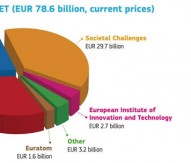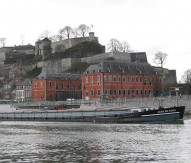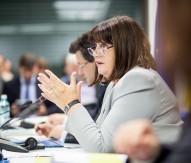
Tekes’ thoughts
As the Finnish Funding Agency for Technology and Innovation, Tekes is considered the most important publicly-funded organisation for financing research, development and innovation in Finland. The agency supports wide-ranging innovation activities in industry and research communities and targets projects that create, in the long-term, the greatest benefits for the economy and society.
The organisation promotes a broad-based view on innovation and besides funding technological breakthroughs, it emphasises the significance of service related, design, business, and social innovations.
Dr Merja Hiltunen is the director of strategic support for programmes and networking activities at Tekes. Hiltunen outlined Tekes’ future priorities and the importance of Horizon 2020.
At a global level, how has the way Tekes operates recently changed?
A new area of Tekes operations has now begun, within which our focus has been modified to include an emphasis on the services we provide in order to promote best practice, internal and external co-operation, and piloting and experimentation.
We are also striving to enhance our international activities, in order to increase the impact we can have. While this is a modification of our more traditional focuses, these points are nevertheless based on our existing strategy.
It is important for us to take into consideration the fact that Finland is a relatively small country with limited resources. As Tekes continues to evolve, we will work to place an even greater emphasis on the quality of our services and, indeed, on the activities of our Finnish team, which works locally with various actors.
Tekes has a special duty to ensure that foresight activities are undertaken and this is another area that we will develop in the future. We will also come to have a much stronger core focus on SMEs and growth companies (internationally active companies seeking further expansion). It is also important that we continue to foster international interest in Finland.
How will the role of Tekes evolve alongside Horizon 2020?
We feel that Horizon 2020 is a much-needed instrument, and, given that we see ourselves as innovation actors, we welcome the European Commission’s focus on innovation and research that is to come through the new framework programme.
We are also impressed by the way in which the Commission has come to promote both the importance of translating research into the market place through the commercialisation of the best results and of networking with various stakeholders, as these are other areas that we too have come to focus on.
At Tekes we have a newly-developed model which includes three levels for our future EU activities. At its core are several central focuses which all tie into the priorities outlines by the Commission: smart cities, services, public procurement and the bioeconomy, as well as SMEs and venture capital funding.
Thus, it is evident that Tekes and Horizon 2020 are both working in the same direction. Indeed, we are following the progress of the next framework programme very closely, and while we acknowledge that the challenges with regard to increasing networking and innovation possibilities may be great, we are looking forward to meeting them head on.
What is more, in addition to this strategic core, we have a further two other levels, the first of which relates to the way in which we will strive to foster an increase in activity by our clients by offering additional support, while the second concerns activities that are nationally important but which have not been included in the core focuses.
Do you think enough is being done in Europe to promote ‘blue sky’ science, or do you feel that more emphasis should be placed on the R&D that holds greater immediate economic and commercial benefit?
It is important to strike the right balance between pure and applied science and I think that will most likely be achieved in Horizon 2020. We hope the fact that Tekes and the Commission seem to be working towards the same goals – to promote excellent science, to commercialise the research results and to create more knowledge, will help to continue this equilibrium, while integrating this knowledge into our economy and our competitiveness.
It is important to note that blue sky thinking and pure science has just as significant a role to play in this as applied research, because when research and innovation is planned, it is sometimes the long-term investments which will bear the most fruit.
How would you like to see the role of PPPs and industry collaboration in European science develop in the future and what role will Tekes play in helping to foster that relationship?
Networking and collaboration in every form is very helpful and I know that the Commission is looking to standardise PPPs, which is a very welcome move. It is important to renew existing structures and while some may seem particularly strong at present, it is never a bad thing to strengthen them further in order to help them to weather future challenges. Similarly, the emergence of a new generation of businesses and business models which are able to generate a significant (economic) benefit for Europe must be helped.
What are your hopes for the future of both Tekes and European R&D?
Horizon 2020 is the instrument that we feel we need and we are looking forward to the strong growth and competitiveness that this framework programme will hopefully bring to both Finland and Europe at large.
It is here too that the long-term investments in research and innovation will come into the picture. Nevertheless, it is important to recognise the need for additional strategy work and, as I have mentioned, foresight work, in order to help Horizon 2020 to fulfil its true potential.
Through Horizon 2020, we would like to see a dynamic, evidence-based programme emerge and there is already a sense that this will be the case. For instance, social challenges are highlighted within the programme, meaning that they are no longer only thematic activities or entities, which is a huge step in the right direction.
In this sense, as Tekes moves forward, we will continue to undertake systemic innovations, to renew European industries and to help new start-ups and other companies to grow.
The bioeconomy will also continue to play a major role in Finland’s future and, as such, will continue to be included in Tekes’ core EU activities. Indeed, we see a lot of potential in the bioeconomy, and given the importance of sustainable growth and the fact that resources and materials are limited, the bioeconomy – as a part of green growth – is a fundamental opportunity for us to exploit.
Dr Merja Hiltunen




